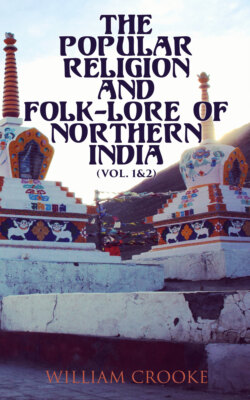Читать книгу The Popular Religion and Folk-Lore of Northern India (Vol. 1&2) - William Crooke - Страница 16
На сайте Литреса книга снята с продажи.
Eclipse Observances.
ОглавлениеTable of Contents
Eclipses are of evil omen. Gloucester sums up the matter:47 “These late eclipses in the sun and moon portend no good to us; though the wisdom of nature can reason it thus and thus, yet nature finds itself scourged by the sequent effects; love cools, friendship falls off, brothers divide; in cities mutinies; in countries discord; in palaces treason; and the bond cracked ’twixt son and father.” The Hindu authority48 writes much to the same effect. “Eclipses usually portend or cause grief; but if rain without unusual symptoms fall within a week of the eclipse, all baneful influences come to nought.”
Among high-caste Hindus no food which has remained in the house during an eclipse of the sun or moon can be eaten; it must be given away, and all earthen vessels in use in the house at the time must be broken. Mr. Conway49 takes this to mean that “the eclipse was to have his attention called by outcries and prayers to the fact that if it was fire he needed there was plenty on earth; and if food, he might have all in the house, provided he would consent to satisfy his appetite with articles of food less important than the luminaries of heaven.” The observance is more probably based on the idea of ceremonial pollution caused by the actual working of demoniacal agency.
Food is particularly liable to this form of pollution. The wise housewife, when an eclipse is announced, takes a leaf of the Tulasî or sacred basil, and sprinkling Ganges water on it, puts the leaf in the jars containing the drinking water for the use of the family and the cooked food, and thus keeps them pure while the eclipse is going on. Confectioners, who are obliged to keep large quantities of cooked food ready, relieve themselves and their customers from the taboo by keeping some of the sacred Kusa or Dûb grass in their vessels when an eclipse is expected. A pregnant woman will do no work during an eclipse, as otherwise she believes that her child would be deformed, and the deformity is supposed to bear some relation to the work which is being done by her at the time. Thus, if she were to sew anything, the baby would have a hole in its flesh, generally near the ear; if she cut anything, the child would have a hare-lip. On the same principle the horns of pregnant cattle are smeared with red paint during an eclipse, because red is a colour abhorred by demons. While the eclipse is going on, drinking water, eating food, and all household business, as well as the worship of the gods, are all prohibited. No respectable Hindu will at such a time sleep on a bedstead or lie down to rest, and he will give alms in barley or copper coins to relieve the pain of the suffering luminaries.
So among Muhammadans,50 a bride-elect sends offerings of intercession (sadqa) to her intended husband, accompanied by a goat or kid, which must be tied to his bedstead during the continuance of the eclipse. These offerings are afterwards distributed in charity. Women expecting to be mothers are carefully kept awake, as they believe that the security of the coming infant depends on the mother being kept from sleep. They are not allowed to use a needle, scissors, knife, or any other instrument for fear of drawing blood, which at that time would be injurious to both mother and child.
But among Hindus the most effectual means of scaring the demon and releasing the afflicted planet is to bathe in some sacred stream. At this time a Brâhman should stand in the water beside the worshipper and recite the Gâyatrî. At an eclipse of the moon it is advisable to bathe at Benares, and when the sun is eclipsed at Kurukshetra. Bernier51 gives a very curious account of the bathing which he witnessed at Delhi during the great eclipse of 1666. In the lower Himâlayas the current ritual prescribes an elaborate ceremony, when numerous articles are placed in the sacred water jar; the image of the snake god, stamped in silver, is worshipped, and the usual gifts are made.52
In Ladâkh ram horns are fixed on the stems of fruit trees as a propitiatory offering at the time of an eclipse, and trees thus honoured are believed to bear an unfailing crop of the choicest fruit.53
Another effectual means of scaring the demon is by music and noise, of which we shall find instances later on. “The Irish and Welsh, during eclipses, run about beating kettles and pans, thinking their clamour and vexations available to the assistance of the higher orbs.”54 So in India, women go about with brass pans and beat them to drive Râhu from his prey.
Of course, the time of an eclipse is most inauspicious for the commencement of any important business. Here again the learned Aubrey confirms the current Hindu belief. “According to the rules of astrology,” he says, “it is not good to undertake any business of importance in the new moon or at an eclipse.”
